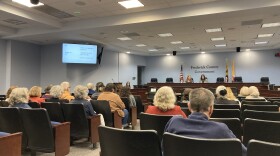At a Wicomico County Council meeting last week, county officials announced they would be halting plans to sign a 287(g) agreement with U.S. Immigration and Customs Enforcement (ICE) to aid in the Trump administration’s mass deportation efforts.
A 287(g) agreement allows ICE to deputize selected state and local law enforcement officers to perform certain functions of federal immigration agents.
There are three 287(g) program models, and Wicomico County was considering participating in the Warrant Service Officer program, which allows ICE to authorize state and local law enforcement officers to serve and execute administrative warrants on unauthorized immigrants within their local jail.
These administrative removal warrants allow officers to arrest non-citizens who have committed immigration violations. Individuals may then be held for up to 48 hours in a local jail while awaiting transfer to ICE custody.
However, new guidance released by Maryland Attorney General Anthony Brown last month caused Wicomico County leaders to reconsider the agreement.
While Maryland does not explicitly prohibit 287(g) agreements, the guidance clarifies local law enforcement is barred from participating in civil immigration enforcement, even when operating under an agreement with ICE.
In order to carry out the 287(g) agreement, Andrew Illuminati, an attorney within the county's Department of Law, explained County Sheriff Mike Lewis was going to cross-designate county deputies as correctional officers due to the current correctional officer shortage.
Illuminati notes there is an important distinction between local law enforcement and correctional officers because the attorney general’s new guidance explicitly states local law enforcement cannot carry out civil immigration enforcement, but it does not prohibit correctional officers from doing so.
“The Department of Law's conclusion, based on that guidance from the attorney general, is that the Oct. 15 guidance concludes that law enforcement officers engaging in cross-designation for the purposes of immigration enforcement opens the county and the individual law enforcement officers to litigation,” Illuminati explained to the county council.
While cross-designation may be off the table, Illuminati says the new guidance doesn’t necessarily stop the county government and correctional officers from entering the 287(g) agreement, but County Executive Julie Giordano wants to hold off.
“I've kind of caught wind that the General Assembly might end up taking out the fact that correctional officers may do this and changing state law. So what I would like to do in this is potentially table this until we get through [legislative] session,” Giordano told the county council, meaning a new agreement wouldn’t be considered until April at the earliest.
Sheriff Lewis made an impassioned speech before the county council, calling out the attorney general directly for making it “very difficult, if not impossible” for the sheriff’s office to work with the county executive on formalizing the agreement.
“Attorney General Anthony Brown recently fired a warning shot across the bow of every law enforcement agency in the state, warning law enforcement, county leaders and municipalities of the civil, and yes, potential criminal consequences, should we choose to cooperate with Immigration and Customs Enforcement or ICE,” Lewis told the council.
Lewis blamed “Maryland politics” for interfering with his office’s work and called the state a “Disneyland for illegal immigrants.”
But advocates who have been pushing against the 287(g) agreement believe community opposition and economic impacts could be the real driver behind the decision to put the ICE collaboration on hold
“This was about this becoming incredibly unpopular in the county,” Maryland ACLU Campaign Strategist Sebastian Brown said. “In a deeply rural county, there was massive public opposition to the point where we believe that there was a lack of actual support, even on the county council. And ultimately, the county executive decided not to even bring it to a council vote, where it appeared that there was not support for moving it forward.”
Brown says community and council members alike expressed distaste in using local taxpayer dollars and public safety officers to fund and carry out immigration enforcement efforts in a county that is already facing staffing shortages.
“This is a real drain on local resources, and that's why I think ultimately, even in these rural pockets, I think there's broad opposition. Because across the political spectrum, that's what's going to continue to be true – this is a drain on local resources, regardless of any specific kind of legal opinions from the [attorney general],” Brown said.
In a statement issued to Delmarva Now in response to Wicomico County leaders arguing the legal guidance disrupted their plans to enter the 287(g) agreement, attorney general spokesperson Jennifer Donelan said:
"The guidance issued by the Attorney General’s Office does not affect 287g agreements. Agencies that have entered into 287g agreements with the federal government are still required to comply with Maryland law. The conduct of those jurisdictions when engaged in law enforcement activities must comply with Maryland statutes and the State and federal Constitutions."
CATA Outreach Coordinator Jean-Frandy Philogene says mass deportation efforts – particularly in Maryland counties like Wicomico where agriculture is the primary industry – could have significant economic impacts.
CATA is a non-profit organization supporting immigrant farmworkers in New Jersey, Pennsylvania and Maryland, and Philogene says his recent focus has been mobilizing Haitian and Latino immigrants to rally against the agreement.
“It’s going to be a disaster,” Philogene said. “They're going to have a shortage of labor, and the immigrants, they are the labor force of the Eastern Shore.”
There are eight Maryland counties engaged in 287(g) agreements with ICE, all of which have sheriff-run detention centers, unlike Wicomico County.
Five counties signed Warrant Service Officer agreements in 2025, while Frederick, Harford and Cecil counties signed Jail Enforcement Model agreements in years prior, which gives more immigration enforcement powers within jail operations.
Frederick County has the longest standing 287(g) agreement in the country, signed in 2008.
Legislation that would have banned 287(g) agreements statewide failed to pass in the Maryland Senate last year after Senate President Bill Ferguson raised concerns over retaliation from the Trump administration.









